 Petzlover
Petzlover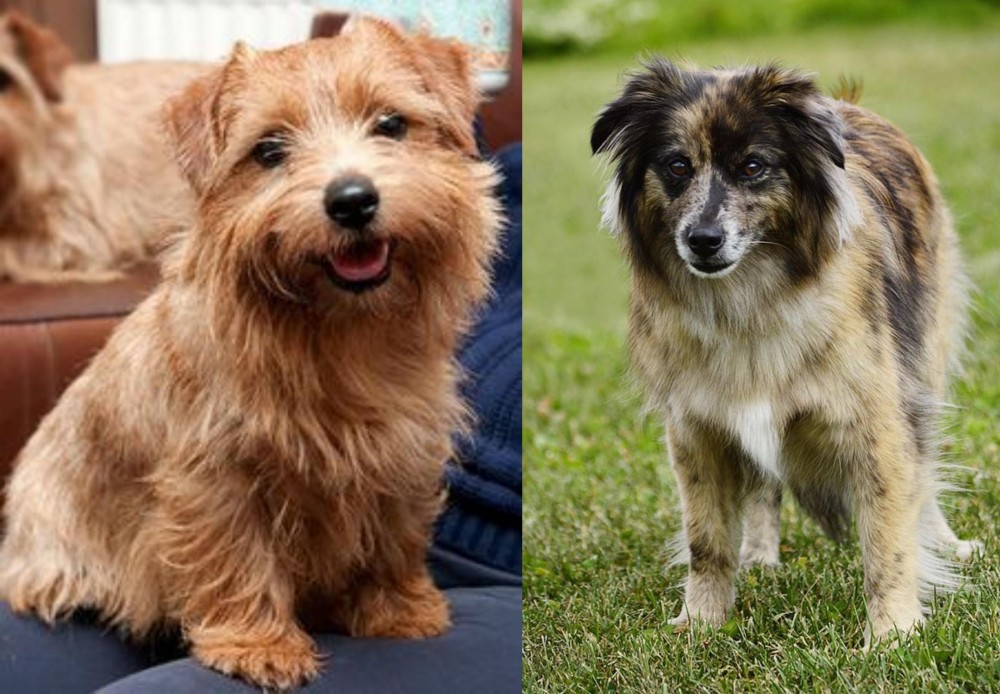 Norfolk Terrier is originated from United Kingdom but Pyrenean Shepherd is originated from Spain. Norfolk Terrier may grow 24 cm / 9 inches shorter than Pyrenean Shepherd. Norfolk Terrier may weigh 14 kg / 30 pounds lesser than Pyrenean Shepherd. Both Norfolk Terrier and Pyrenean Shepherd has same life span. Both Norfolk Terrier and Pyrenean Shepherd has almost same litter size. Both Norfolk Terrier and Pyrenean Shepherd requires Moderate Maintenance.
Norfolk Terrier is originated from United Kingdom but Pyrenean Shepherd is originated from Spain. Norfolk Terrier may grow 24 cm / 9 inches shorter than Pyrenean Shepherd. Norfolk Terrier may weigh 14 kg / 30 pounds lesser than Pyrenean Shepherd. Both Norfolk Terrier and Pyrenean Shepherd has same life span. Both Norfolk Terrier and Pyrenean Shepherd has almost same litter size. Both Norfolk Terrier and Pyrenean Shepherd requires Moderate Maintenance.
 It was in the 1880s that a working terrier was developed in eastern England. The Norfolk Terrier was developed by crossing local terrier-like dogs with the Irish Terrier breed as well as small red terriers.
It was in the 1880s that a working terrier was developed in eastern England. The Norfolk Terrier was developed by crossing local terrier-like dogs with the Irish Terrier breed as well as small red terriers.
Known first as the Cantab Terrier and then later as the Trumpington Terrier, the name changed further but in 1932, the Norwich was accepted into the English Kennel Club and the first written standard was created.
The Norfolk Terrier was recognized by the United Kennel Club in 1979. It has gained recognition as an independent breed but is a variety of the Norwich Terrier, distinguished from it by having floppy ears and not erect ears. Both the Norfolk- and Norwich are the smallest of the working terriers.
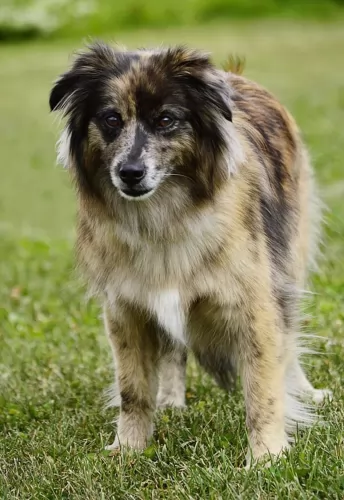 The Pyrenean Shepherd hails from Spain where he has always been used to herd sheep. Some people believe he is a descendant of the French Catalan Sheepdog while others say from the Briard. Nobody is too sure.
The Pyrenean Shepherd hails from Spain where he has always been used to herd sheep. Some people believe he is a descendant of the French Catalan Sheepdog while others say from the Briard. Nobody is too sure.
He is actually the smallest of the French herding breeds. It is interesting to note that he still does this herding job today. It was in the 19th century that a few of these dogs left for America with shepherds who found work herding flocks in the American West.
These dogs were also used in World War 1 as messenger dogs.
It was during the 1970's and 1980's that breeding programs were started for the dog and The Pyrenean Shepherd Club of America was formed in 1987. The dog was also recognized in 2009 by the American Kennel Club.
 The Norfolk Terrier is a small purebred dog, standing at 23 to 25cm in height and weighing roughly between 4.5kg and 6kg. The dog has a wire-haired coat which can be in different colors such as wheaten, red, black and grey or grizzle.
The Norfolk Terrier is a small purebred dog, standing at 23 to 25cm in height and weighing roughly between 4.5kg and 6kg. The dog has a wire-haired coat which can be in different colors such as wheaten, red, black and grey or grizzle.
The hair on his head and ears is shorter and smoother and he has longer whiskers and eyebrows. The chest is deep, the front legs are short and straight and the tail has always been docked to half its length but left long these days. The tail is set high and carried erect.
Norfolks are feisty, fearless dogs with an independent streak. They’re gentle though, and when it comes to being a companion dog, they get on well with children and other pets. They thrive on their human family’s companionship and wouldn’t do well at all if they were constantly left outside.
They’re not yappy dogs but will bark occasionally so he can sound the alarm if strangers approach.
This little dog is able to live in the city or the countryside, but just because he is little, you can’t neglect his exercise needs. He will most certainly need to be exercised every day and taken for walks as he is an energetic, lively dog. He is intelligent too and easy to train and socialize, turning him into such an obedient, pleasurable pet.
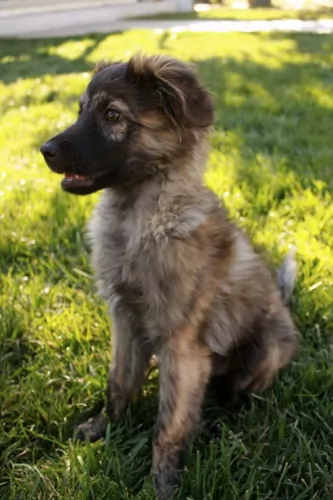 The Pyrenean Shepherd is a medium-sized dog standing at between 38 and 50cm in height and weighing between 14 and 20kg.
The Pyrenean Shepherd is a medium-sized dog standing at between 38 and 50cm in height and weighing between 14 and 20kg.
His head is fairly small with large, bright, expressive eyes. The ears are semi-erect. The tail has always traditionally been docked but often left long these days.
He comes with two different coat types – rough and smooth with sometimes both types being in the same litter. The dog is a regular shedder. The coat can be medium length or long and slightly wavy with a harsh texture. The coat can be of the shorter type with finer, softer hair. The coat is available in different colors and patterns, and can be a fawn color or grey and you will find a black overlay occasionally with some white. The coat can be tri-colored or he can be in solid colors such as cream or white.
Your feisty Pyrenean Shepherd is a dog with plenty of personality. He is also full of energy and will love to live with a outdoorsy-type family who are always on the go, because he’s in on everything.
He is distrustful of strangers and this together with the fact that he is so alert, makes him a splendid watchdog too.
He will need to be trained and socialized as he can be overly robust. He becomes obedient and well mannered, being totally dedicated to his owner. It isn’t easy for him to be separated from his beloved human owner.
 Fearless and brave, the Norfolk Terrier promises to be a wonderful companion.
Fearless and brave, the Norfolk Terrier promises to be a wonderful companion.
They're social, loving dogs and want to be part of the household. He is lively and active too and wants to be included in your walks and your games. He loves nothing more than to be running across a field after a ball.
They’re such amicable pets that they make great dogs for first-time dog owners. Let him into your heart and your home – he makes such a splendid pet – that once you’ve had one, you’ll realize you can never be without such a wonderful pet and companion again.
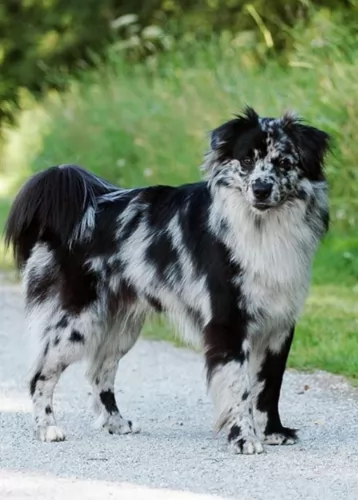 The Pyrenean Shepherd is essentially a one-person dog, becoming totally attached to one particular person in the family.
The Pyrenean Shepherd is essentially a one-person dog, becoming totally attached to one particular person in the family.
He is known as a dog who becomes totally loyal to his human family, getting on well with children as well as with other pets in the home.
He is aloof and wary of strangers. Training and socialization is important so as to avoid aggression and fear. This is one dog that requires being diligently exercised every day.
He is a great watchdog, and when you add up all his fantastic qualities, you get to realize what a splendid companion and pet this wonderful dog makes.
 The life expectancy of your Norfolk Terrier is 8 to 14 years, but there are some who have received excellent care and who have reached 17 years of age.
The life expectancy of your Norfolk Terrier is 8 to 14 years, but there are some who have received excellent care and who have reached 17 years of age.
Just as with any other dog, they are prone to common dog illnesses, and these can include dental issues and mitral valve disease. They also are prone to hip dysplasia, and according to the Orthopedic Foundation for Animals (OFA) they are known for problematic hips.
 The Pyrenean Shepherd is such a jovial little dog that you just can’t imagine him ever being sick. When he is lethargic, you'll know there is something seriously wrong with him because he is always as bright as a button.
The Pyrenean Shepherd is such a jovial little dog that you just can’t imagine him ever being sick. When he is lethargic, you'll know there is something seriously wrong with him because he is always as bright as a button.
He can however get sick, and there are a few dog illnesses such as epilepsy, eye problems and hip dysplasia that can be very painful ad debilitating for such an energetic dog. You don’t have to be too concerned though, as he is a dog known to have minimal health issues.
 The Norfolk Terrier’s hard, wiry, straight coat requires being hand stripped about twice a year by hand or with a stripping knife. The paws will also need to be trimmed.
The Norfolk Terrier’s hard, wiry, straight coat requires being hand stripped about twice a year by hand or with a stripping knife. The paws will also need to be trimmed.
It is recommended to keep the hair short around the anus for hygienic purposes and the tail itself will need to be stripped.
The Norfolk doesn’t shed his coat naturally, and the hair keeps growing, making the dog uncomfortable and ungroomed looking. The dog will certainly need to have his hair kept away from around the eyes.
If you don’t want to strip your dog, there are people who take their dogs to professional groomers, but then this professional grooming makes it that the texture of the dog’s coat changes from wiry to soft.
Small dogs are prone to dental problems, so check your dog’s teeth regularly. A bad tooth can play havoc with your dogs general health.
As with any other dog, the Norfolk Terrier will do well on high-quality kibble, specially formulated for small dog breeds. For a tasty treat, boil some chicken and vegetables such as sweet potato, carrots and spinach in a pot, chop them up and add to his kibble with some brown rice and pasta. A tiny bit of raw meat added in occasionally is all this little dog needs to stay healthy and content.
Don’t ‘treat’ him by giving him chocolates, chips and peanuts. You will upset his stomach. Dogs do best on simply, healthy, tasty diets such as mentioned above. Make sure he has a constant supply of fresh, cool water.
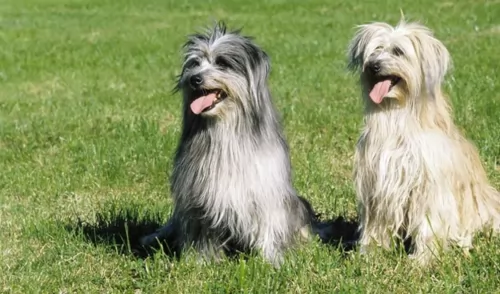 This will depend on the coat type. Both coat types will essentially require you brushing him twice a week.
This will depend on the coat type. Both coat types will essentially require you brushing him twice a week.
The Pyr Shep’s activity levels are very high and this dog will require living with people who love outdoor activities. He’s the perfect companion for those camping trips or hikes. He is always ready to join you on your walks and will be ready and waiting to jump right in when he sees you with a ball or frisbee.
For all that energy, your Pyrenean Shepherd will be needing the best dog food there is. Food full of preservatives and colorants can be bad for your pet, detrimental to his health.
Good food full of vitamins and minerals will ensure your pet stands a good chance of living a long, healthy life. If you feed him commercially manufactured dog food, ensure its the best there is, with labeling on the packaging that tells you its for his age, his size and energy levels.
Consistency and simplicity is what your Pyrenean Shepherd wants, and home-made food can enhance his dry kibble. Boiled chicken, brown rice or pasta and spinach, sweet potatoes and carrots all chopped up and mixed into the dry kibble once or twice a week will ensure your pet’s eyes are continuously bright and alert and his tail constantly wagging.
Some raw meat added in occasionally will also go towards ensuring his good health. Always make sure he has access to fresh, cool water.